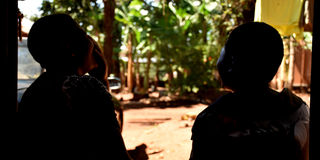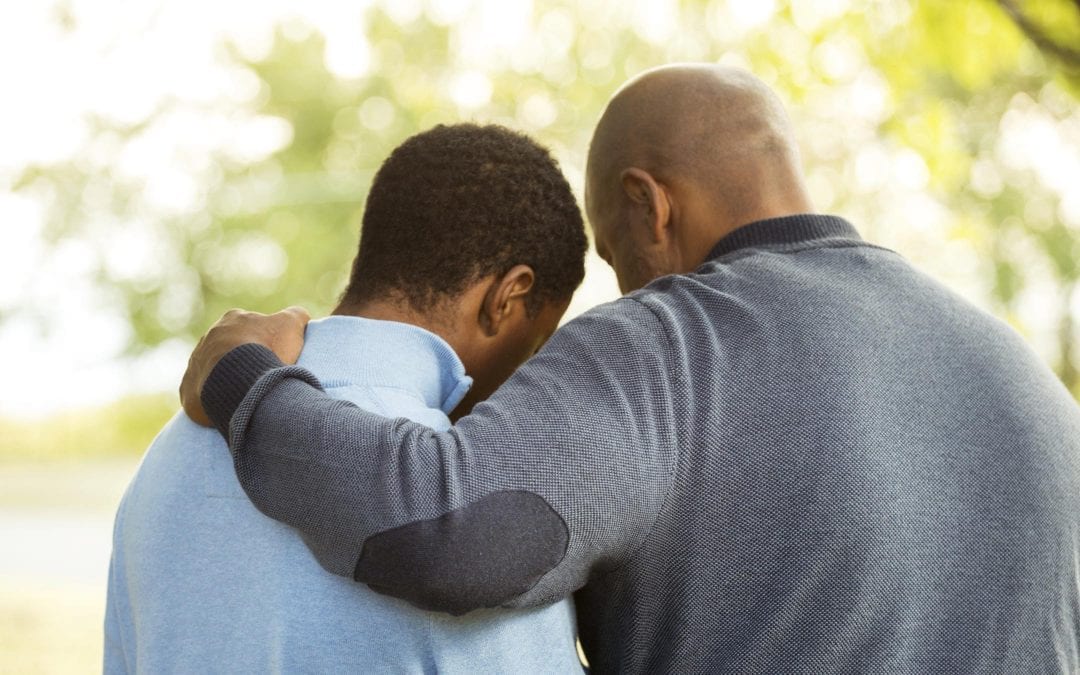Prime
Mental illness in the eyes of mother and child

What you need to know:
Patients say medication is expensive and appeal to government to make them accessible like HIV/Aids drugs. They also want employers to stop discriminating against them.
At 39, "Maria" thought she had seen it all. She was 14 when she first suffered symptoms of a mental disorder. Orphaned, she dropped out of school in Primary Five, did menial jobs, was abandoned by family, friends and the fathers of her three daughters and was humiliated when she ran naked in broad daylight in a Kampala suburb, where she lived with her in-laws.
Admitted at Butabika National Referral Mental Hospital severally between 2012 and 2015, Maria, who naturally hated drugs, had learnt that adhering to medication—mood stabilisers and other bipolar medicines—and avoiding trigger factors such as stress, had given her six years of a normal, productive life without pschotic episodes.
ALSO READ: Of public health and mental illness
“My focus was on providing for my three daughters,” Maria remembers. She had just depleted her meagre savings on school fees and acquiring a retail shop from a neighbour and her immediate target was boosting her stock.
Then another tragedy struck. May last year, Maria was called to pick her daughter "Joy" from school because her behaviour was unusual.”
Like any mother, she thought it was a minor illness and told the school administration to send her back home.
Joy’s behaviour shocked Maria. It reminded her of what she had previously experienced. “Maybe it is a fever; maybe someone wronged her,” Maria’s thoughts raced in doubt.
She could not imagine that her daughter could suffer the same disorder she had battled since adolescence. Maria, 40 and her 16-year old first-born had an uncanny resemblance. But that resemblance is more than physical.
Maria rushed Joy to church. But she refused to eat and only drank a little. She soiled her clothes. “But the day she threw her poop at the congregation I decided she needed more than prayers,” Maria recalls.
At Butabika, Joy was diagnosed with bipolar affective disorder, the same condition her mother lives with. It is characterised by mood swings, with periods of both depression and mania.
During such episodes, the introverted Joy becomes very talkative and dances uncontrollably. Sometimes she is excessively weak and feels worthless.
Her mother confesses singing excessively, walking aimlessly and experiencing excessive body weakness.
Other symptoms include excessive energy, insomnia, rapid emotional changes, uncontrollable racing thoughts, uncoordinated speech and ideas, loss of appetite; dislike of work, family and friends; guilt and suicidal thoughts, among others.
Maria says her father suffered a mental disorder, but experts say, it is not obvious that she inherited it from him or passed it on to her daughter, Joy.
“I sank in despair; always cried, wondering why all this was happening to me,” Maria says.
“The children who should have cared for me in my old age are also getting sick? Why don’t I die? But who will care for my sick child? Nobody can handle her whenever those episodes appear,” she wondered.
Trouble after trouble
After weeks of tending to her daughter, Maria’s stock got spoilt yet she had to send Joy back to school, with enough medication to contain her mental illness.
Still, Maria had some doubt and stopped her daughter’s medication by June 2021. Joy lived a normal life, but in January, when she had just resumed school, the attack returned with rage.
“I struggled alone to sit with her on a boda-boda from the school, deep in the village to the main road, where we got a taxi to Kampala,” says Maria.
They reached Butabika past 10pm and medics faulted Maria for halting Joy’s medication. Joy spent three weeks at the hospital.
Hiding the truth
Pregnant with her third child, Maria worked as a housemaid in a wealthy home, but could not let her employers know she was taking medication for mental illness. When they learnt of her pregnancy, they were concerned that the drugs could harm her.
They could even drive her to Kampala when she had to visit Butabika but she could not tell them which hospital she was visiting.
“I told them the drugs were for treating stress and were harmless. What if I told them the truth and lost my job?” says Maria, who has lost friends and family due to her mental condition.
Joy also faces that dilemma of asking for help, yet fearing that disclosing her condition, will expose her to discrimination and stigma. Already some people call her a lunatic.
“My best friend reminds me to take my tablets every day, but I cannot tell her what the tabs are for; I fear if she knows my condition she might abandon me,” says Joy.
When a teacher randomly reminded her to take her medicine, she fretted. “I hate it because if everyone knows, they might start marginalising me,” says Joy adding that already, she feels insecure being selected or left out of school activities.
So is it not better if the teachers know about her condition? “Well, they are the ones that call mom when I am not fine, but I fear that the teachers and students will isolate me. It is tricky,” Joy adds.
Even the school director warned her never to reveal her problem. Before the disease, Joy was a playful girl; who loved netball, volleyball and dancing, but sometimes she isolates herself, feeling “I do not belong with the rest. I feel like I am an outcast.”
To cope, Joy reads novels, plays sports, chats with friends or consults teachers. “That makes me feel fresh and distracts me from the negative thoughts.”
Help they need
In the first week of May, when we visited Maria, second term was due. The peasant single mother needed tuition and scholastic materials for her three girls, plus at least Shs60,000 for Joy’s medicine for a term.
“Our medicine is very expensive and hard to find in many health facilities. I wish the government could make them accessible as it is for HIV/Aids medicine,” Maria wishes.
She also needs parity in the job sector. “We need a system that encourages employers to hire people with mental issues because if we adhere to medical advice, we can be productive. And we need the jobs because our lives are expensive yet we get little support from society,” Maria says.
Maria is grateful to the couple that employed her as a housemaid for six years, enabling her to save money and buy a plot of land. “But could they trust me with their children if they knew my mental troubles?” Maria doubts.
Maria is equally thankful to her “only sincere friend, who has lived with Joy since she was four months old.” Joy wishes everyone treats her like the school director. “I need to study, play and mix freely with others… isolation just worsens my illness,” says Joy.
Bridging the gap
Since inception in 2016, YouBelong Uganda, a non-profit organisation, has reintegrated patients from Butabika Hospital into communities. Joy is a member of their youth consultative group, where children and adolescents with mental illness meet to share experiences and hopes, which helps the organisation design suitable programmes.
Those meetings have helped Joy confront tough questions about her mental health and believe she has something worth living for.
YouBelong Uganda is soon launching a programme to promote awareness about mental health in schools, so that teachers can identify symptoms of mental distress among learners and refer them to the relevant health facilities.
Sumaya Dawa, a psychiatric nurse working with YouBelong Uganda, says parents should monitor children’s growth and behaviour because failure to hit certain milestones or some traits could signal a mental disorder and need immediate response.
“Early detection and intervention is key in addressing mental illness; but masses lack the knowledge,” says Ethel Nsangi, the group lead of Women 4 Women, a YouBelong Uganda crew of social workers and psychiatric nurses with a bias to girls’ and women’s needs. “That is the gap we are trying to bridge.”
Already, the organisation is training primary health workers in government health centres in Kampala and Wakiso districts to enable them detect mental distress symptoms among patients and refer them to relevant authorities.
Aware that much cannot be achieved without supportive communities, Nsangi urges schools to create healthy learning environments, where bullying, stigma and corporal punishments are prohibited. “Learners also need a teacher who understands their behaviours.” She also appeals to employers to provide healthy working conditions and give a chance to patients who have recovered from mental illness.
Case for girls, women
Last week, Ministry of Health reported that 14 million out of the 42 million Ugandans have mental health challenges. Simply put, three out of every 10 Ugandans, have mental issues. Quite a significant number, yet experts say, it could be bigger now because the samples were done in 2019, before Covid-19 came.
According to the World Health Organisation, women are twice more likely than men to experience mental health problems and three times more likely than men to attempt suicide—though men commit suicide four times more often.
Nsangi cites sexual abuse, lack of education, unemployment, early marriage, poverty, marital issues, crime, the burden of being caretakers, among the factors that expose women and girls to mental disorders. The Borgen Magazine published in the United Kingdom December 2021, cited similar factors as the leading causes of mental health problems in African girls and women.
“Yes, even boys and men suffer mental disorders, but females are more susceptible to particular disorders such as depression, thus more vulnerable to mental disorders. And sometimes, it is a vicious circle, where one leads to another,” Nsangi emphasises.
Prevention and cure
Winnie Wanyenze, a psychiatric nurse at YouBelong Uganda, says while mental disorders cannot be cured, adherence to medication and psychotherapy greatly reduce frequency and severity of episodes.
Edith Kebirungi, a social worker with YouBelong Uganda, says mental disorders can also be prevented by reducing risk factors such as substance abuse, avoiding or coping well with stress and living in a habitable environment, among others.
Hope amidst despair
Maria knows parents who abandon their mentally sick children, but her own experience as a patient made her the best caretaker for her daughter.
Once Joy’s mental attack coincided with her menstrual periods. She could not wear sanitary towels. Sometimes she pulled them away, her mother says. That is why these girls need a mother or a passionate nurse.
“With good care, she can live a normal life,” Maria says with some relief. “My mother is my hero,” says Joy, flashing a beautiful smile. “Even before this sickness, she did everything for me and I know she will always be there for me. I wish I could give her everything she wishes.”
The mother returned the compliment, with a smile. “She is very hard working, very neat. I am proud of her and I know she will succeed and be able to help me in old age.”
Joy loves fashion and cosmetology. But her biggest dream is being a surgeon and tries her best to compete in sciences and English. Last term, she lost five weeks undergoing treatment. And every morning and evening she loses hours recovering from side effects of the medication. But she performed well, except in Physical Education and Geography.
“When I am fine, I copy the notes I missed, revise, consult teachers and discuss with friends.” Joy knows that if she avoids very noisy environments; stress, overexcitement and isolation and takes her medication, she will make it.
“We know we will not stop taking the medication, but we pray that God protects us from more attacks. And let it stop with us,” they say.
Subjects’ names were altered on their request.




